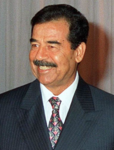
Saddam Hussein Abd al-Majid al-Tikriti was an Iraqi politician and revolutionary who served as the fifth president of Iraq from 1979 to 2003. He also served as prime minister of Iraq from 1979 to 1991 and later from 1994 to 2003. He was a leading member of the revolutionary Arab Socialist Ba'ath Party, and later, the Baghdad-based Ba'ath Party and its regional organization, the Iraqi Ba'ath Party, which espoused Ba'athism, a mix of Arab nationalism and Arab socialism.
2024 (MMXXIV) is the current year, and is a leap year starting on Monday of the Gregorian calendar, the 2024th year of the Common Era (CE) and Anno Domini (AD) designations, the 24th year of the 3rd millennium and the 21st century, and the 5th year of the 2020s decade.

Iraq actively researched and later employed weapons of mass destruction (WMD) from 1962 to 1991, when it destroyed its chemical weapons stockpile and halted its biological and nuclear weapon programs as required by the United Nations Security Council. The fifth president of Iraq, Saddam Hussein, was internationally condemned for his use of chemical weapons against Iranian and Kurdish civilians during the Iran–Iraq War in the 1980s. Saddam pursued an extensive biological weapons program and a nuclear weapons program, though no nuclear bomb was built. After the Gulf War, the United Nations located and destroyed large quantities of Iraqi chemical weapons and related equipment and materials; Iraq ceased its chemical, biological and nuclear programs.
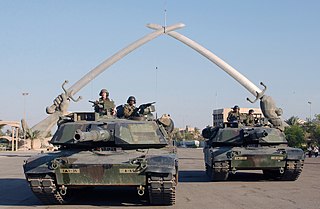
The United States public's opinion on the invasion of Iraq has changed significantly since the years preceding the incursion. For various reasons, mostly related to the unexpected consequences of the invasion, as well as misinformation provided by US authorities, the US public's perspective on its government's choice to initiate an offensive is increasingly negative. Before the invasion in March 2003, polls showed 47–60% of the US public supported an invasion, dependent on U.N. approval. According to the same poll retaken in April 2007, 58% of the participants stated that the initial attack was a mistake. In May 2007, the New York Times and CBS News released similar results of a poll in which 61% of participants believed the U.S. "should have stayed out" of Iraq.

This article describes the positions of world governments before the actual initiation of the 2003 invasion of Iraq, and not their current positions as they may have changed since then.

April Catherine Glaspie is an American former diplomat and senior member of the Foreign Service, best known for her role in the events leading up to the Gulf War.

The 2008 United States presidential election was the 56th quadrennial presidential election, held on November 4, 2008. The Democratic ticket of Barack Obama, the junior senator from Illinois, and Joe Biden, the senior senator from Delaware, defeated the Republican ticket of John McCain, the senior senator from Arizona, and Sarah Palin, the governor of Alaska. Obama became the first African American to be elected to the presidency, as well as being only the third sitting United States senator elected president, joining Warren G. Harding and John F. Kennedy. Meanwhile, this was only the second successful all-senator ticket since the 1960 election and is the only election where both major party nominees were sitting senators. This was the first election since 1952 in which neither the incumbent president nor vice president was on the ballot, as well as the first election since 1928 in which neither ran for the nomination.

Ghazi Mashal Ajil al-Yawar is an Iraqi politician. He was the vice president under the Iraqi Transitional Government in 2006, and was interim president of Iraq under the Iraqi Interim Government from 2004 to 2005. He also served as the president of the Governing Council of Iraq in 2004 following the US-led coalition invasion.

After the 2003 invasion of Iraq, evidence began to emerge of failed attempts by the Iraqi government to bring the conflict to a peaceful resolution.
Unanimity is agreement by all people in a given situation. Groups may consider unanimous decisions as a sign of social, political or procedural agreement, solidarity, and unity. Unanimity may be assumed explicitly after a unanimous vote or implicitly by a lack of objections. It does not necessarily mean uniformity and can sometimes be the opposite of majority in terms of outcomes.
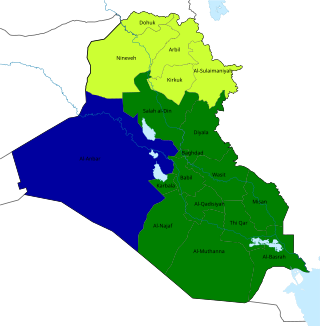
Parliamentary elections were held in Iraq on 30 January 2005 to elect the new National Assembly, alongside governorate elections and a parliamentary election in Kurdistan Region. The 275-member legislature had been created under the Transitional Law during the international occupation. The newly elected body was given a mandate to write a new constitution and exercise legislative functions until the new constitution came into effect. The elections also led to the formation of the Iraqi Transitional Government.

The 2004 United States presidential election was the 55th quadrennial presidential election, held on Tuesday, November 2, 2004. The Republican ticket of incumbent President George W. Bush and his running mate incumbent Vice President Dick Cheney were elected to a second term, defeating the Democratic ticket of John Kerry, a United States senator from Massachusetts and his running mate John Edwards, a United States senator from North Carolina.
Under the Iraqi constitution of 1925, Iraq was a constitutional monarchy, with a bicameral legislature consisting of an elected House of Representatives and an appointed Senate. The lower house was elected every four years by manhood suffrage. The first Parliament met in 1925. Ten general elections were held before the overthrow of the monarchy in 1958.

The Council of Representatives, usually referred to simply as the Parliament, is the unicameral legislature of the Republic of Iraq. According to the Constitution of Iraq, it is the lower house of the bicameral legislature of the country. As of 2020, it comprises 329 seats and meets in Baghdad inside the Green Zone.
The Saddam–al-Qaeda conspiracy theory was based on false claims by the United States government alleging that a secretive relationship existed between Iraqi president Saddam Hussein and the Sunni pan-Islamist militant organization al-Qaeda between 1992 and 2003. The George W. Bush administration promoted it as a main rationale for invading Iraq in 2003.

Christopher Paul Carney is an American politician who was the U.S. representative for Pennsylvania's 10th congressional district from 2007 to 2011. He is a member of the Democratic Party.
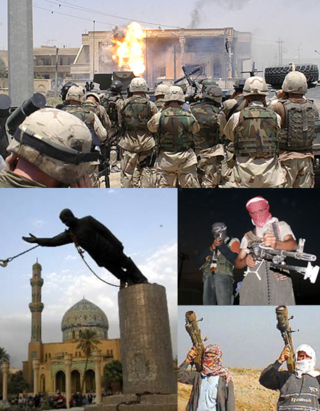
The Iraq War was a protracted armed conflict in Iraq from 2003 to 2011. It began with the invasion of Iraq by the United States-led coalition that overthrew the Ba'athist government of Saddam Hussein. The conflict continued for much of the next decade as an insurgency emerged to oppose the coalition forces and the post-invasion Iraqi government. US troops were officially withdrawn in 2011.
These are some of the notable events relating to politics in 2006.

A presidential referendum was held in Iraq on October 15, 1995. It was the first direct presidential election under the rule of Saddam Hussein, who had seized power through the Revolutionary Command Council (RCC) in 1979. Taking the form of a referendum with no other candidates, the election involved giving voters paper ballots that said: "Do you approve of President Saddam Hussein being the President of the Republic?" They then used pens to mark "yes" or "no". The next day, Izzat Ibrahim al-Douri, Hussein's deputy in the ruling RCC, announced the incumbent had won 99.96% of some 8.4 million valid votes cast. Officially, 3,052 people voted against him, and turnout was 99.47%. The international community reacted with widespread incredulity to these figures.
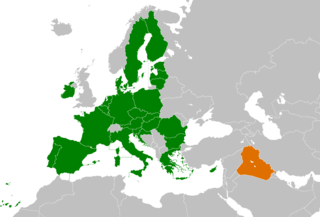
Iraq – European Union (EU) relations are the international relations between Iraq and the EU. Relations have been strained from the early 1990s but are now gradually progressing. From Brussels, Iraq has mostly been considered as falling under the U.S. area of responsibilities, independently from the close economic ties between certain European states and Saddam Hussein’s Iraq prior to the international sanctions regime, or the participation of five European countries in the U.S.-led invasion and occupation of the country. Should Turkey's accession to the EU take place, Iraq will border the European Union.

